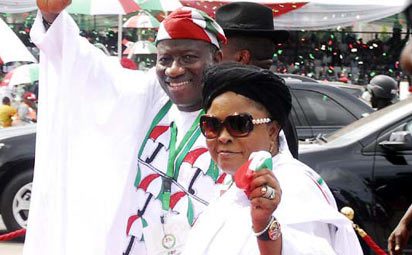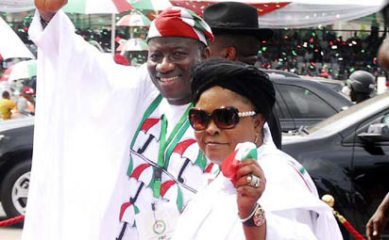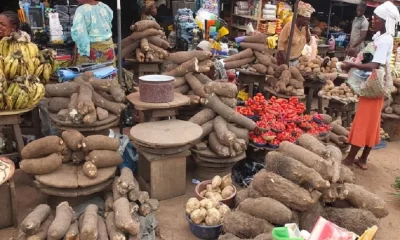Political Issues
Jonathan, PDP and the no-alternatives narrative -By Johnson Momodu

In Nigerian politics, it is a waste of campaign efforts to try to canvass for the votes of some categories of the electorate. The first category comprises voters who have firmly made up their minds concerning whom to vote for. Given the nature of their support, nothing can possibly change their choice. For instance, General Muhammadu Buhari commands a chunk of fanatical young supporters in the Northern parts of the country. It is almost impossible to change the minds and orientations of these rabid Buharians.
The second category of voters are those usually referred to as “floating voters” made up of members of the electorate who have decided on whom to support but remain malleable and, therefore, subject to change. This category also includes those yet to decide on where to pitch their camp. Electioneering campaigns are mainly targeted at this group of voters who are persuadable, convertible or simply buyable in the Nigerian way.
Between now and February 2015 when the general elections will hold, the major political parties, especially the Peoples Democratic Party (PDP), the All Progressives Congress (APC) and the All Progressive Grand Alliance (APGA) will be in a fierce competition to win votes. The questions to ask are: What have the parties got to offer Nigerians? What will they do to improve the quality of life of Nigerians, protect life and property? What are their credentials and records of achievement? Of the political parties, only the PDP can boast of previous performances at the federal and state levels. And, among the presidential contestants, only President Jonathan has had the experience of having served as President in a civilian administration.
Until the merger that gave birth to the APC, which is the main opposition party, the parties that came together were fragmented, poorly organised and lacking in vision and focus. Their experience in governance was limited to a few States. Today, all that the APC promising Nigerians is “change” in some nebulous terms, without any clear definition of what it means or how it is to be effected. The APC spends much of its time on destructive criticisms of virtually every policy and action of President Jonathan and his administration.
In developed democracies of the world such as the United States and the UK, the main opposition parties have their own shadow cabinets with appropriate policies and programmes, prepared to step in as alternative governments should the needs arise . Hand over power to the APC today and the party would be in total darkness as what to do! The main reason some of our opposition parties are seeking power is because they perceive government as an opportunity, not for service but for self-aggrandisement. Herein lies the dangers of electing a party such as the APC, because it would take the country back to the pre-democracy years.
If the leadership of the APC were truly ready to take over government and serve the people of this country, it would spell out detailed alternative plans of how it intends to tackle the nation’s economic challenges; what the party would do to diversify our sources of income and solve the problems of our dependence on oil; how it intends to improve on the nation’s infrastructure challenges, power supply, road construction, or deal with healthcare, education, unemployment, etc.
The APC ought to roll out details of its plans and strategies on how it intends to put an end to the challenges of insurgency in the North East. This is the only way the party can inject content into its message of change to the Nigerian electorate and be taken seriously. It is not enough to “sweep out the PDP” as the APC National Chairman, Chief John Odigie-Oyegun, sings everyday; he must go beyond the call of “Bring–Back–Our Girls” and tell Nigerians how his party would have resolved the problem, were it given the opportunity. For now, the APC should be advised to stop talking about change, until it has worked out acceptable details and convinced Nigerians of what it plans to do if given power.
The goodluck which the PDP enjoys today is, first, that no opposition party is ready to offer itself to Nigerians as a viable alternative. Secondly, the party, at all levels of governance, has a history of 15 years of uninterrupted service to Nigeria. In spite of the daunting challenges, the PDP Government has an enviable record of service in areas, including the welfare of the people, provision of infrastructure and social amenities, the economy, poverty alleviation, security and governance in general. With all modesty, since the PDP Federal Government assumed power in 1999, it has succeeded in rescuing the country out of the slavery of foreign debts accumulated by previous Governments. It is the PDP Government that has moved Nigeria to the position of Number 1 economy in Africa, expanded university education by privatising the sector and allowing the establishment of more than 70 private universities, with the attendant expansion of university opportunities for Nigerian youths; brought a revolution of telecommunication, through the GSM and took Nigeria to the club of space research, through the launching of her own satellite. More critically, it is the PDP Government that has finally found the solution to Nigeria epileptic power supply by successfully privatising the sector. Indeed, after 15 years of service, the PDP can proudly say that it has been tested and should be trusted by Nigerians.
As for the Presidential Aspirants, Dr. Goodluck Jonathan, General Muhammadu Buhari, Alhaji Atiku Abubakar and the others, the verdict should not be difficult to reach. Without going into details, Nigerians know the antecedents of Buhari, whose economic policies as Head of State, attracted sanctions from the West, thereby ruining the economy and necessitating our adoption of the policy of devaluation and IMF conditionalities. Also, Buhari’s human rights profile has not been favourable to the image of Nigeria. What about Atiku Abubakar? Apart from those who dance around this man for whatever reasons, the only thing that Nigerians know about Atiku is inconsistency. It is not clear if the man himself knows what he wants for himself, not to talk of what he wants to do for Nigerians. The good thing about democracy is that everybody, including Atiku Abubakar, is free to vote and be voted for.
When all is said and done, the only serious candidate, among those to contest the 2015 presidential elections, is President Goodluck Ebele Jonathan, who has been tested after years of service through the PDP. Indeed, the credit for the bulk of achievements by the PDP Government goes to President Jonathan as well as his predecessors in office. He towers over and above all the other contestants.
President Jonathan’s greatest achievement is not so much in the areas of the economy, infrastructure or social amenities, as in the development of democracy. He assumed office with a pledge to reform the nation’s electoral system. His dictum of “one man-one vote” has been a major success so much so that incidents such as the imposition of candidates, rigging and ballot box-snatching, etc., are now things of the past. Under President Jonathan, elections in Nigeria have been free, fair and credible. Coupled with these electoral reforms, President Jonathan has a commendable human rights profile. More importantly, he is a committed patriot who, in spite, of mounting challenges, has kept Nigeria one and united. There can be no doubt that most Nigerians will give him their votes in 2015, under the platform of the PDP.


















